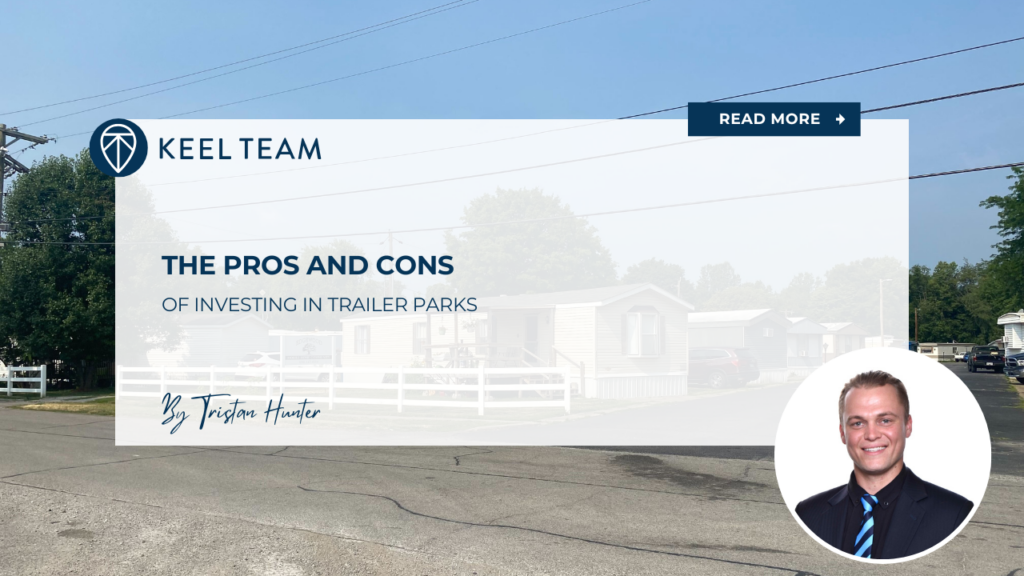The Pros and Cons of Investing in Trailer Parks
-
 Tristan Hunter - Investor Relations
Tristan Hunter - Investor Relations

Investing in trailer parks typically offers unique opportunities for those seeking alternative real estate investments. However, like any investment, it comes with its own set of advantages and potential drawbacks. Evaluating both sides could help you determine whether owning a mobile home park aligns with your goals. This article explores the pros and cons of mobile home park investments, helping you weigh your options carefully.
Pros of Investing in Trailer Parks
1. Potential for Steady Income
Mobile home parks have the potential to provide consistent income through lot rents. Unlike traditional apartment complexes, most mobile home park tenants own their homes and rent only the land. This setup could lead to more stable income since tenants who own their homes might be less likely to leave, reducing turnover. Additionally, lot rents in mobile home parks are often more affordable than other housing options, which might attract tenants looking for long-term affordability.
2. Demand for Affordable Housing
The demand for affordable housing continues to grow in many regions, and mobile home parks often fill this need. With rising costs in traditional housing, mobile home parks could remain a sought-after option. This demand might create opportunities for mobile home park investors to maintain high occupancy rates and generate returns.
3. Lower Maintenance Responsibilities
Since mobile home park tenants typically own their homes, the property owner typically only needs to maintain the common areas, utilities, and infrastructure. This could mean fewer maintenance costs compared to other real estate types, like multifamily apartments, where the landlord must handle repairs for individual units. While some maintenance is always required, the reduced responsibilities might make mobile home parks attractive to investors seeking less hands-on involvement.
4. Diverse Revenue Streams
Mobile home parks may offer additional ways to generate revenue. For example, you could charge fees for utilities, storage, or amenities like RV parking. Some mobile home park owners lease vacant lots to tenants who bring in their own homes, reducing upfront costs for the investor. Others might explore selling mobile homes on rent-to-own agreements, which could create another income stream.
5. Potentially Lower Acquisition Costs
Mobile home parks often cost less to acquire compared to other types of real estate with similar income potential. This affordability might allow investors to enter the market with less capital. Additionally, mobile home parks in rural or underserved areas may present opportunities to acquire properties at a lower price point, though location always plays a critical role in value.
Download our FREE eBook on the Top 20 things to know BEFORE investing in mobile home parks!
Cons of Investing in Trailer Parks
1. Management Challenges
While mobile home parks may require less maintenance, they can still demand active management. Dealing with tenant concerns, maintaining infrastructure, and enforcing rules might require consistent effort. If a mobile home park lacks proper management, it could lead to high turnover, neglected properties, or community dissatisfaction. Investors who prefer passive income might need to hire a property manager, which could increase operating costs.
2. Zoning and Regulatory Restrictions
Mobile home parks are often subject to strict zoning and regulatory requirements. Depending on the location, getting approval for expansions or upgrades might be difficult. Additionally, some areas may impose restrictions on the number of lots or the types of homes allowed in the mobile home park. These regulations could limit an investor’s ability to grow the property or improve returns.
3. Risk of Deferred Maintenance
Some mobile home parks, especially older ones, might come with deferred maintenance issues. Aging infrastructure, such as water or sewer lines, could require significant investment to repair or replace. If a mobile home park has not been well-maintained, the costs to bring it up to standard might outweigh the initial affordability of the property. Thorough due diligence is often necessary to avoid unexpected expenses.
4. Tenant Turnover and Default Risks
While many tenants in mobile home parks stay long-term, there’s no guarantee of tenant stability. Some tenants may face financial difficulties, leading to late payments or evictions. If a tenant abandons their mobile home, the property owner might need to bear the cost of removing or reselling it. High turnover rates in a mobile home park could also increase vacancy and reduce income predictability.
5. Financing Difficulties
Securing financing for a mobile home park investment might be more challenging than for other real estate types. Banks and lenders often view mobile home parks as specialized assets, which could lead to higher interest rates or stricter loan terms. If a mobile home park has a large number of park-owned homes, it might be even harder to obtain favorable financing. Investors should explore lending options carefully to ensure the numbers work.

Factors to Consider Before Investing
1. Location Matters
The success of a mobile home park often depends on its location. Mobile home parks near growing cities or areas with a high demand for affordable housing might offer better opportunities than those in declining markets. Evaluate local job opportunities, population trends, and other economic factors to assess whether a mobile home park’s location might support long-term occupancy.
2. Community Reputation
A mobile home park’s reputation can significantly influence its success. Mobile home parks with well-maintained common areas and satisfied tenants may attract more stable renters. On the other hand, a mobile home park with frequent complaints or a neglected appearance could struggle to retain tenants. Reviewing tenant feedback and community conditions might provide valuable insights.
3. Infrastructure and Utilities
Outdated infrastructure in a mobile home park could result in significant costs for the owner. Conducting inspections before purchasing might help you identify potential issues with water lines, sewer systems, or electrical grids. Understanding the condition of the utilities might help you estimate future repair or upgrade expenses.
4. Tenant Ownership vs. Park-Owned Homes
Mobile home parks with tenant-owned homes often have fewer maintenance responsibilities for the owner. However, if a mobile home park has many park-owned homes, the owner may face higher maintenance costs and tenant turnover. Balancing tenant ownership with the mobile home park’s overall profitability potential could be a key consideration.
Weighing the Pros and Cons
Every investment opportunity comes with its own risks and rewards, and mobile home parks are no exception. While they might offer steady income, lower maintenance, and a growing demand for affordable housing, they also require careful management and due diligence. Evaluating the pros and cons might help you decide whether investing in trailer parks fits your financial goals and risk tolerance.
Conclusion
Investing in trailer parks can present opportunities, but it also comes with challenges that may require thoughtful planning. By understanding the potential benefits, such as consistent income and lower maintenance, as well as the possible drawbacks, like regulatory hurdles and tenant turnover, you may make more informed decisions. Carefully evaluating factors like location, infrastructure, and community reputation could provide a clearer picture of the property’s potential. While no investment guarantees success, approaching a mobile home park investment with diligence and preparation could help you align it with your broader investment strategy.
Are you looking for MORE information? Book a 1-on-1 consultation with Andrew Keel to discuss:
- A mobile home park deal review
- Due diligence questions
- How to raise capital from investors
- Mistakes to avoid, and more!
Disclaimer:
The information provided is for informational purposes only and is not investment advice or a guarantee of any kind. We do not guarantee profitability. Make investment decisions based on your own research and consult registered financial and legal professionals. We are not registered financial or legal professionals and do not provide personalized investment recommendations.

Tristan Hunter - Investor Relations
View The Previous or Next Post
Subscribe Below 👇





